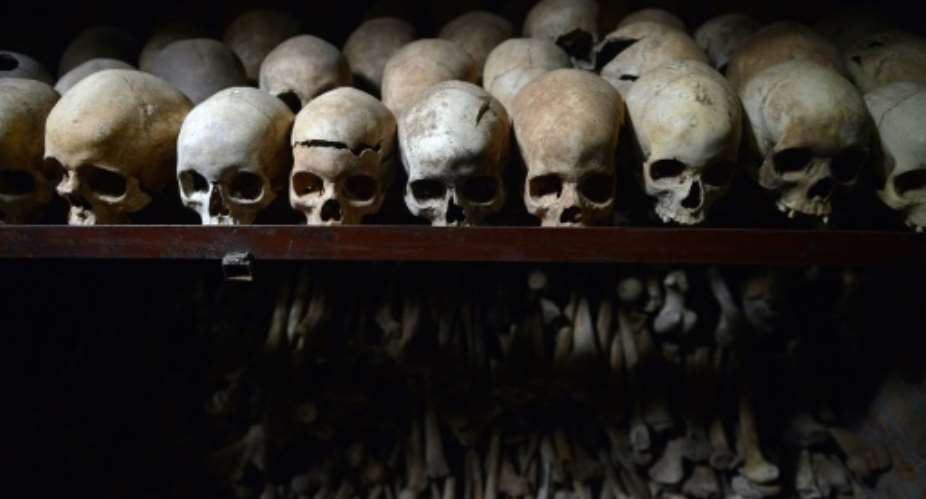Paris (AFP) - A Paris court will rule Wednesday in the trial of two former Rwandan mayors accused of orchestrating the massacre of hundreds of Tutsis during the country's 1994 genocide.
Octavien Ngenzi, 58, and his predecessor Tito Barahira, 64, are accused of playing a direct role in the slaughter in their village of Kabarondo, where some 2,000 people seeking refuge in a church were bludgeoned and hacked to death.
The eight-week trial has heard chilling testimony depicting the two men as "supervisors" and "executioners" in the massacre at the height of the genocide in which 800,000 people, mostly ethnic Tutsis, were killed by Hutu extremists.
"Ngenzi was the leader," said prosecutor Philippe Courroye, who requested life sentences for the two men. Barahira was the "dreaded machete officer".
Ngenzi and Barahira deny the charges.
Their lawyers have pointed to contradictory testimony 22 years after the killings to argue that reasonable doubt exists over the defendants' role, portraying them as having been helpless to stop the chaos unfolding around them.
One of their lawyers, Francoise Mathe, gave an emotional six-hour closing speech on Tuesday in which she said Ngenzi had done the best he could with "six police officers for 35,000 residents."
However a lawyer for civil parties to the case, Gilles Paruelle, told the jury: "To kill one man, hatred is sufficient. To kill 1,000, you need organisation."
- 'Don't waste the bullets' -
The violence broke out in Kabarondo a week after the shooting down of a plane carrying Rwanda's president Juvenal Habyarimana, which inflamed ethnic tensions and sparked the genocide.
Among those seeking shelter at the church on April 13, 1994, when the genocidal Hutu "Interahamwe" militia attacked, was Marie Mukamunana, who told the court how her seven children and husband were killed by grenades and machetes.
"Someone said 'don't waste the bullets' and they continued with machetes," she said.
She recalled seeing former mayor Barahira "armed with a gun, among the Interahamwe" and testified that Ngenzi was "supervising the massacre."
Jean-Damascene Rutagungira -- who lost 21 members of his family including his wife and children -- told the court he saw the pair encouraging the killers, shouting "cut them down."
The bloodshed in Kabarondo, a town near the border with Tanzania, was over by the end of April, when Tutsi rebels in the armed wing of what is now the ruling Rwandan Patriotic Front (FPR) took control of the area.
Elsewhere in the former Belgian colony, the slaughter continued until the FPR fighters finally prevailed in July.
- Rwandans tried around the globe -
Ngenzi and Barahira were sentenced in absentia to life imprisonment by Rwandan people's courts, known as gacaca, in 2009.
Ngenzi has been in custody since 2010 when he was captured in the French overseas department of Mayotte off the east coast of Africa, where he had been living under a false name.
Barahira was arrested in 2013 in the southwestern French city of Toulouse where he was living.
Their trial in France comes two years after Pascal Simbikangwa, a former Rwandan army captain, was tried in Paris and jailed for 25 years for his role in the genocide -- the first such conviction in a country that had previously dragged its heels on prosecuting Rwandan genocide cases.
The UN International Criminal Tribunal for Rwanda, which ended its mandate in 2015, sentenced 61 people for their role in the genocide.
Alleged genocidaires have also been captured and tried in Belgium, France, Sweden, Canada, Finland, Germany, Norway, the Netherlands and the United States.
Memories of the genocide continue to strain relations between France and Rwanda, which accuses Paris of complicity -- and even direct involvement -- in the violence because of its support for the Hutu nationalist government of the day.
Kigali broke off ties with Paris in 2006 after a French judge issued arrest warrants against nine Rwandan officials over Habyarimana's assassination.
The diplomatic freeze lasted for three years.





 S.Africa building collapse kills one, traps dozens: police
S.Africa building collapse kills one, traps dozens: police
 Election 2024: I’m ready to serve Ghana with my heart, energies – Bawumia
Election 2024: I’m ready to serve Ghana with my heart, energies – Bawumia
 We saved Ghana $19million in 2020 elections – EC
We saved Ghana $19million in 2020 elections – EC
 Nobody has ever enticed me with money to rule in his or her favour — Otumfuo
Nobody has ever enticed me with money to rule in his or her favour — Otumfuo
 Limited voter registration: Dumsor will not affect registration, we've rented ge...
Limited voter registration: Dumsor will not affect registration, we've rented ge...
 Back Free SHS policy with legislative instrument to prevent successive govt from...
Back Free SHS policy with legislative instrument to prevent successive govt from...
 Dadieso LPG tanker accident: No live or property lost as speculated, product suc...
Dadieso LPG tanker accident: No live or property lost as speculated, product suc...
 EOCO to return docket on Cecilia Abena Dapaah to OSP over lack of evidence
EOCO to return docket on Cecilia Abena Dapaah to OSP over lack of evidence
 Police, youth clash at Dambai; teenager killed by stray bullet
Police, youth clash at Dambai; teenager killed by stray bullet
 Court convicts student for issuing GHC50,000 dud cheque
Court convicts student for issuing GHC50,000 dud cheque
